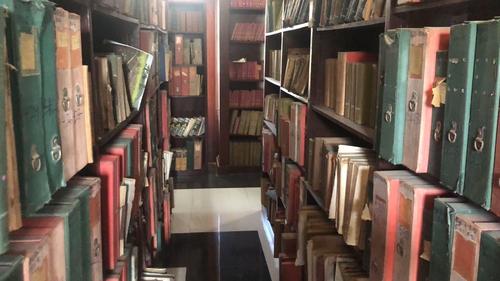Tim Kerkmann
At Humboldt University’s Institute of Asian and African Studies, Kerkmann explores how the Great Depression fueled independence movements in the British Empire between 1929 and 1939. His research draws on archival work in Ghana, Malaysia, and London.
May 15, 2025
Tim Kerkmann
Tim Kerkmann in front of the National Archives of Ghana in Accra (November 2024)
British Colonial Reports stemming from the 1930s, in the Balme Library of the University of Ghana in Accra-Legon
Tim Kerkmann in Kuala Lumpur during his archival research trip to Malaysia (March 2025)
Tim Kerkmann completed his B.A. studies in History (major) and Geography (minor) at the Universities of Tübingen and Aix-en-Provence (France). He then pursued a Master’s degree in Global History, which took him to Humboldt University of Berlin, Freie Universität Berlin, and the University of Zaragoza (Spain).
After receiving his Master’s degree from Humboldt and Freie Universität in February 2022, Kerkmann initially worked as a financial journalist. Since October 2024, he has devoted himself entirely to his doctoral research in African History at Humboldt University, a project he began in October 2022.
In his PhD project, Kerkmann investigates the largely understudied impact of the Great Depression on the British colonies of the Gold Coast (modern-day Ghana) and British Malaya (modern-day Peninsular Malaysia). His analysis spans the years 1929 to 1939, with a particular emphasis on the early 1930s, when the global economic upheaval reached its height.
The project arises from the identification of two key gaps in the research. First, economic history has long focused on the Great Depression’s effects in Europe and the United States, while comparative case studies of the Global South remain rare. Second, studies on independence movements often begin after 1945, overlooking earlier anti-colonial resistance in the interwar years—resistance that laid the groundwork for future upheavals.
To address these gaps, Kerkmann’s dissertation focuses on two tropical plantation colonies within the British Empire during the Great Depression. Both were deeply integrated into the global economy: the Gold Coast’s prosperity depended on world market prices for cocoa and gold, while Malaya relied heavily on rubber and tin. The vulnerability of these economies became starkly apparent during the Depression, when commodity prices collapsed by more than half within a few months. This severe trade shock triggered profound economic disruptions, exacerbated social tensions, and provoked political responses.
Kerkmann’s central argument is that the Great Depression exposed the structural fragilities of colonial economic systems and played a pivotal role in politicizing broad segments of the population. In the Gold Coast, rural protests, tax boycotts, and early anti-colonial movements gained momentum. In Malaya, however, ethnic divisions and repressive measures—including the forced repatriation of hundreds of thousands of Chinese and Indian workers—curtailed broader mobilization. These contrasting responses, Kerkmann argues, can be explained by differing patterns of land ownership, labor migration, and social power structures.
To capture these dynamics, the dissertation combines perspectives from economic and political history with a transcontinental comparative approach. It draws on a wide range of previously underutilized sources that Kerkmann accessed during three-month archival research stays in Accra (Ghana) and Kuala Lumpur (Malaysia), supported by a research grant from the German Academic Exchange Service (DAAD). In autumn 2025, he will consult additional key sources at the British National Archives in London.
Kerkmann’s PhD project is supervised by Prof. Dr. Baz Lecocq and, since April 2025, has been supported by a one-year completion grant from the Elsa Neumann Foundation of the State of Berlin.
Further Information
Email: timrubenkerkmann95@gmail.com




